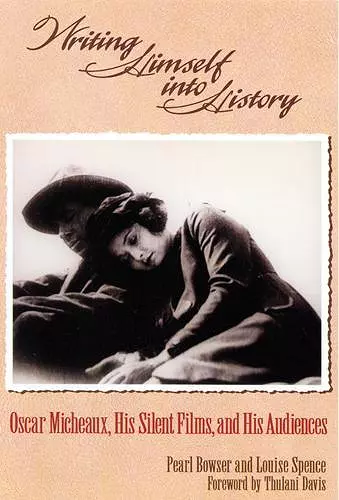Writing Himself Into History
Oscar Micheaux, His Silent Films, and His Audiences
Louise Spence author Pearl Bowser author
Format:Paperback
Publisher:Rutgers University Press
Currently unavailable, and unfortunately no date known when it will be back

Winner of the 2001 Kraszna-Krausz Moving Image Book Awards | Winner of the Theatre Library Association Award
Writing Himself Into History is an eagerly anticipated analysis of the career and artistry surrounding the legendary Black filmmaker Oscar Micheaux. With the exception of Spike Lee, Micheaux is the most famous—and prolific—African American film director. Between 1918 and 1948 he made more than 40 “race pictures,” movies made for and about African Americans. A man of immense creativity, he also wrote seven novels.
Pearl Bowser and Louise Spence concentrate here on the first decade of Micheaux’s career, when Micheaux produced and directed more than twenty silent features and built a reputation as a controversial and maverick entrepreneur. Placing his work firmly within his social and cultural milieu, they also examine Micheaeux’s family and life. The authors provide a close textual analysis of his surviving films (including The Symbol of the Unconquered, Within Our Gates, and Body and Soul), and highlight the rivalry between studios, dilemmas of assimilation versus separatism, gender issues, and class. In Search of Oscar Micheaux also analyzes Micheaux’s career as a novelist in relation to his work as a filmmaker.
This is a much-awaited book that is especially timely as interest in Micheaux’s work increases.
Oscar Micheaux's name is emblazoned on a golden star on Hollywood Boulevard and on a Lifetime Achievement Award from the Director's Guild of America, as well as an award named after him from the Black Filmmakers Hall of Fame. Yet this pioneering African-American novelist, screenplay writer, producer and director was forgotten for decades after his heyday in the late 1920s and '30s, and is relatively unknown today. Born in 1884, Micheaux published his first novel at age 29, and released his first film six years later, in 1919. At the time of his death in 1951, he had not only written seven novels but had also written, produced or directed more than 40 films. Perhaps just as important, Micheaux "developed a public persona of an aggressive and successful businessman and a controversial and confident maverick producer," which allowed him to transcend the enormous obstacles faced by African-American artists of his generation. Bowser (founder of African Diaspora Images) and Spence (associate professor of media studies at Sacred Heart University in Connecticut) study Micheaux's early career up to 1929, examining both the African-American and mainstream social and political contexts surrounding his work. Reacting against critiques that Micheaux was a product of a reactive, even defensive racial sensibility, the authors deftly place the artist in the context of the "symbols, artifacts, and social realities of Black popular life and culture." While the book's circumscribed scope may primarily attract readers who are already familiar with his work, this engaging, freshly researched look at a major American artist is an important contribution to both U.S. history and media studies. * Publishers Weekly *
Although Bowser (codirector of the documentary Midnight Ramble: Oscar Micheaux and the Story of Race Movies) and Spence (media studies, Sacred Heart Univ.) focus solely on the 20 silent films Micheaux directed between 1919 and 1929, the reader gets a stronger feel for the cultural milieu of Micheaux!s work here than in Green!s book. The authors carefully interlace their own critiques of these films with contemporary African American press responses, details on moviegoing in an era of segregated cinemas, and biographical information derived from interviews with the director!s family and others involved in early African American cinema. The plentiful production stills highlight this highly readable narrative. Both books are highly recommended for all film and black studies collections as the only major press monographs to treat this sorely neglected pioneer." —Anthony J. Adam, Prairie View AM Univ., TX * Library Journal *
- Winner of Kraszna-Krausz Book Award 2002
ISBN: 9780813528038
Dimensions: unknown
Weight: 454g
280 pages